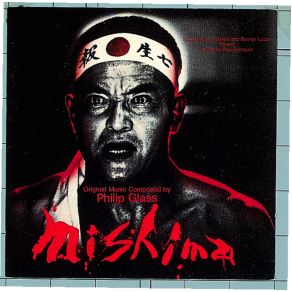Mishima (Original Music Composed By Philip Glass)
Download links and information about Mishima (Original Music Composed By Philip Glass) by Philip Glass. This album was released in 2002 and it belongs to Theatre/Soundtrack genres. It contains 14 tracks with total duration of 45:58 minutes.

|
|
|---|---|
| Artist: | Philip Glass |
| Release date: | 2002 |
| Genre: | Theatre/Soundtrack |
| Tracks: | 14 |
| Duration: | 45:58 |
| Buy it NOW at: | |
| Buy on iTunes $9.99 | |
Tracks
[Edit]| No. | Title | Length |
|---|---|---|
| 1. | Mishima/Opening | 2:46 |
| 2. | November 25: Morning | 4:11 |
| 3. | 1934: grandmother & Kimitake | 3:37 |
| 4. | Temple of the Golden Pavilion ("like some enormous music") | 3:01 |
| 5. | Osamu's Theme: Kyoko's House | 2:59 |
| 6. | 1937: Saint Sebastian | 1:07 |
| 7. | Kyoko's House ("stage blood is not enough") | 5:02 |
| 8. | November 25: Ichigaya | 2:14 |
| 9. | 1957: Award Montage | 3:57 |
| 10. | Runaway Horses ("poetry written with a splash of blood") | 9:08 |
| 11. | 1962: Body Building | 1:29 |
| 12. | November 25: The Last Day | 1:30 |
| 13. | F-104: epilogue from Sun And Steel | 1:58 |
| 14. | Mishima/Closing | 2:59 |
Details
[Edit]Philip Glass is an acquired taste. Particularly in some of his earliest works, Glass stripped his compositions down to such a minimal level that it's hard for casual listeners to appreciate. One of the pieces on this album, for instance, Music for Voices, is definitely not for the squeamish. Composed in 1970 and recorded live at the Paula Cooper Gallery in 1972 (accounting for the somewhat hissy sound) Music for Voices is exactly that: eight a cappella voices chanting solfa in repeated patterns, slowly varying the dynamics and rhythms. In the right frame of mind, this hypnotic humming can be affecting and mesmerizing. It can also be incredibly annoying. Dedicated fans of the composer's earliest works will be fascinated by this raw piece. The second composition on the CD, however, holds a broader appeal while still retaining a "stripped-down" approach. Another Look at Harmony, Pt. 4 features the much more familiar setting of chorus against electric organ (played, as usual, by longtime Glass collaborator Michael Riesman), recorded in 1989 with a resultant cleaner and more immediate sound. Similar in feel to Glass' early operas and parts of his landmark score for the film Koyaanisqatsi, Another Look at Harmony, Pt. 4 finds Glass moving beyond his Music in Twelve Parts to further explore his approach to harmony. The result is a transcendent piece worthy of dedicated listening time. This second piece makes the CD worth investigating for Glass fans.